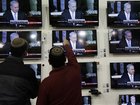Israeli Prime Minister Benjamin Netanyahu's blistering attack on a U.S. push for a nuclear accord with Iran soured ties with Washington but could boost his prospects in elections this month, experts say.
Netanyahu, seeking re-election on March 17, infuriated the White House with his address Tuesday to U.S. Congress, where he laid out Israeli concerns at an emerging world deal with Iran on its nuclear program.
 Full Story
Full Story
The United States said Wednesday tough challenges remained to seal a nuclear deal with Iran, vowing not to be distracted by external politics in its quest to stop Tehran acquiring the atomic bomb.
Secretary of State John Kerry and his Iranian counterpart Mohammad Javad Zarif wrapped up three days of "intense" nuclear negotiations in the Swiss lakeside town of Montreux with still no deal, as a March 31 deadline for a framework agreement looms.
 Full Story
Full Story
Israeli Prime Minister Benjamin Netanyahu on Wednesday brushed aside criticism from U.S. President Barack Obama of his speech to Congress, in which he warned Washington was paving the way to a nuclear-armed Iran.
The White House was infuriated by Netanyahu's address Tuesday to a joint session of the U.S. Congress, where he laid out Israeli concerns at an emerging world deal with Iran on its nuclear program.
 Full Story
Full Story
Lebanese Forces chief Samir Geagea described the presidential deadlock as a “misery,” laying blame on Hizbullah-backer Iran and saying no solution was currently lying on the horizon .
“More than any other time Iran does not want a president for Lebanon unless he belonged to its camp,” Geagea told journalists who visited him in Maarab on Tuesday.
 Full Story
Full Story
U.S. Senate Majority Leader Mitch McConnell said Tuesday that debate should begin next week on bipartisan legislation requiring President Barack Obama to submit any nuclear deal with Iran to Congress for its approval.
That debate could also open the door for consideration of new economic sanctions on the regime in Tehran, a move strongly opposed by the Obama administration amid ongoing international negotiations with Iran.
 Full Story
Full Story
Prime Minister Benjamin Netanyahu's impassioned speech Tuesday in the U.S. Congress impressed many Israelis in Jerusalem but drew criticism from others who said he was interfering in American affairs.
Netanyahu delivered with gusto an address in which he chided Israel's arch-foe Iran and charged that a deal between the Islamic republic and world powers would allow it to develop nuclear weapons.
 Full Story
Full Story
Israel reportedly expressed readiness to increase tension along the border with Lebanon to block the road on Hizbullah's movement and expansion in Syria, in particular in the Golan Heights.
Western diplomatic sources quoted high-ranking Israeli officials as saying that the developments in the Golan are planned by the Islamic Republic of Iran and directly linked to the negotiations over Tehran's nuclear program.
 Full Story
Full Story
Western democracies should ask themselves some tough questions about why they have produced some of the extremists wreaking havoc in the world today, Iran's foreign minister said Monday.
In a speech before the U.N. Human Rights Council in Geneva, Mohammad Javad Zarif accused the West of "selectivity and double standards" in its dealings with the Muslim world, suggesting a bit of "soul-searching" would be in order.
 Full Story
Full Story
U.S. Secretary of State John Kerry on Monday warned Israel's prime minister against revealing details at his upcoming speech to U.S. Congress of an Iran nuclear deal that world powers are in the process of negotiating.
While he did not mention Benjamin Netanyahu by name, Kerry told reporters in Geneva he was "concerned by reports" that "selective details" of the deal aimed at curbing Tehran's nuclear program would be revealed in the coming days.
 Full Story
Full Story
After years of strained relations over the Syrian conflict, Palestinian Islamist group Hamas is looking to mend ties with its traditional backer Iran. But reconciliation is proving far from simple.
The outbreak of Syria's civil war nearly four years ago provoked a rupture between Hamas and Iran, after the movement threw its support behind rebels fighting President Bashar Assad, a close ally of Tehran.
 Full Story
Full Story



